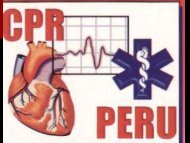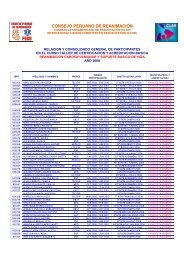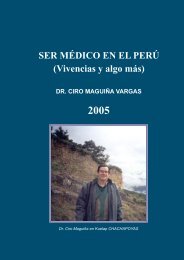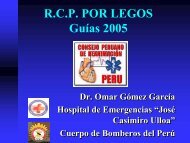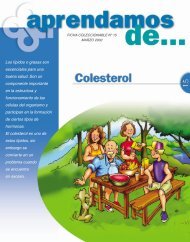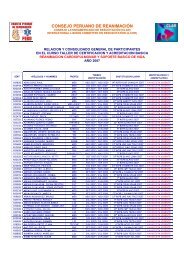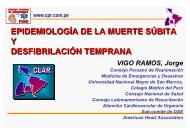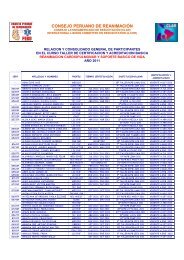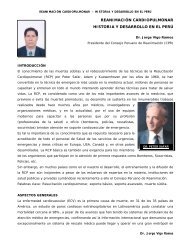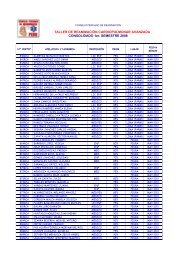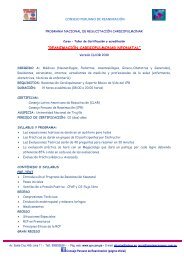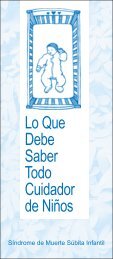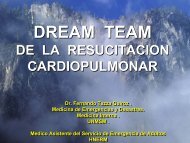18 de 0ctubre de 2010 www.elsuapdetodos.com1432 J. Soar et al. / <strong>Resuscitation</strong> 81 (2010) 1400–1433430. Fisher B, Worthen M. Cardiac arrest induced by blunt trauma in children. PediatrEmerg Care 1999;15:274–6.431. Hazinski MF, Chahine AA, Holcomb 3rd GW, Morris Jr JA. Outcome of cardiovascularcollapse in pediatric blunt trauma. Ann Emerg Med 1994;23:1229–35.432. Calkins CM, Bensard DD, Partrick DA, Karrer FM. A critical analysis of outcome<strong>for</strong> children sustaining cardiac arrest after blunt trauma. J Pediatr Surg2002;37:180–4.433. Yanagawa Y, Saitoh D, Takasu A, Kaneko N, Sakamoto T, Okada Y. [Experienceof treatment <strong>for</strong> blunt traumatic out-of-hospital cardiopulmonary arrestpatients over 24 years: head injury v.s. non-head injury]. No Shinkei Geka2004;32:231–5.434. Pickens JJ, Copass MK, Bulger EM. Trauma patients receiving <strong>CPR</strong>: predictors ofsurvival. J Trauma 2005;58:951–8.435. Di Bartolomeo S, Sanson G, Nardi G, Michelutto V, Scian F. HEMS vs. ground-BLScare in traumatic cardiac arrest. Prehosp Emerg Care 2005;9:79–84.436. Willis CD, Cameron PA, Bernard SA, Fitzgerald M. Cardiopulmonary resuscitationafter traumatic cardiac arrest is not always futile. Injury 2006;37:448–54.437. David JS, Gueugniaud PY, Riou B, et al. Does the prognosis of cardiac arrestdiffer in trauma patients? Crit Care Med 2007;35:2251–5.438. Crewdson K, Lockey D, Davies G. Outcome from paediatric cardiac arrest associatedwith trauma. <strong>Resuscitation</strong> 2007;75:29–34.439. Huber-Wagner S, Lefering R, Qvick M, et al. Outcome in 757 severelyinjured patients with traumatic cardiorespiratory arrest. <strong>Resuscitation</strong>2007;75:276–85.440. Lockey D, Crewdson K, Davies G. Traumatic cardiac arrest: who are the survivors?Ann Emerg Med 2006;48:240–4.441. Cera SM, Mostafa G, Sing RF, Sarafin JL, Matthews BD, Heni<strong>for</strong>d BT. Physiologicpredictors of survival in post-traumatic arrest. Am Surg 2003;69:140–4.442. Esposito TJ, Jurkovich GJ, Rice CL, Maier RV, Copass MK, Ashbaugh DG. Reappraisalof emergency room thoracotomy in a changing environment. J Trauma1991;31:881–5, discussion 5–7.443. Martin SK, Shatney CH, Sherck JP, et al. Blunt trauma patients with prehospitalpulseless electrical activity (PEA): poor ending assured. J Trauma2002;53:876–80, discussion 80–1.444. Domeier RM, McSwain Jr NE, Hopson LR, et al. <strong>Guidelines</strong> <strong>for</strong> withholding ortermination of resuscitation in prehospital traumatic cardiopulmonary arrest.J Am Coll Surg 2003;196:475–81.445. Gervin AS, Fischer RP. The importance of prompt transport of salvage of patientswith penetrating heart wounds. J Trauma 1982;22:443–8.446. Branney SW, Moore EE, Feldhaus KM, Wolfe RE. Critical analysis of twodecades of experience with postinjury emergency department thoracotomyin a regional trauma center. J Trauma 1998;45:87–94, discussion-5.447. Durham III LA, Richardson RJ, Wall Jr MJ, Pepe PE, Mattox KL. Emergency centerthoracotomy: impact of prehospital resuscitation. J Trauma 1992;32:775–9.448. Frezza EE. Mezghebe H. Is 30 minutes the golden period to per<strong>for</strong>m emergencyroom thoratomy (ERT) in penetrating chest injuries? J Cardiovasc Surg (Torino)1999;40:147–51.449. Powell DW, Moore EE, Cothren CC, et al. Is emergency department resuscitativethoracotomy futile care <strong>for</strong> the critically injured patient requiring prehospitalcardiopulmonary resuscitation? J Am Coll Surg 2004;199:211–5.450. Coats TJ, Keogh S, Clark H, Neal M. Prehospital resuscitative thoracotomy <strong>for</strong>cardiac arrest after penetrating trauma: rationale and case series. J Trauma2001;50:670–3.451. Wise D, Davies G, Coats T, Lockey D, Hyde J, Good A. Emergency thoracotomy:“how to do it”. Emerg Med J 2005;22:22–4.452. Kwan I, Bunn F, Roberts I. Spinal immobilisation <strong>for</strong> trauma patients. CochraneDatabase Syst Rev 2001:CD002803.453. Davies G, Lockey D. Establishing the radical intervention of pre-hospital thoracotomyas a part of normal physician pre-hospital practice. Scand J TraumaResusc Emerg Med 2007;15:106.454. Matsumoto H, Mashiko K, Hara Y, et al. Role of resuscitative emergency fieldthoracotomy in the Japanese helicopter emergency medical service system.<strong>Resuscitation</strong> 2009;80:1270–4.455. Voiglio EJ, Coats TJ, Baudoin YP, Davies GD, Wilson AW. Resuscitative transversethoracotomy. Ann Chir 2003;128:728–33.456. Practice management guidelines <strong>for</strong> emergency department thoracotomy.Working Group, Ad Hoc Subcommittee on Outcomes, American College ofSurgeons-Committee on Trauma. J Am Coll Surg 2001;193:303–9.457. Fialka C, Sebok C, Kemetzhofer P, Kwasny O, Sterz F, Vecsei V. Open-chestcardiopulmonary resuscitation after cardiac arrest in cases of blunt chest orabdominal trauma: a consecutive series of 38 cases. J Trauma 2004;57:809–14.458. Jones JH, Murphy MP, Dickson RL, Somerville GG, Brizendine EJ. Emergencyphysician-verified out-of-hospital intubation: miss rates by paramedics. AcadEmerg Med 2004;11:707–9.459. Jemmett ME, Kendal KM, Fourre MW, Burton JH. Unrecognized misplacementof endotracheal tubes in a mixed urban to rural emergency medical servicessetting. Acad Emerg Med 2003;10:961–5.460. Katz SH, Falk JL. Misplaced endotracheal tubes by paramedics in an urbanemergency medical services system. Ann Emerg Med 2001;37:32–7.461. Deakin CD, Peters R, Tomlinson P, Cassidy M. Securing the prehospital airway:a comparison of laryngeal mask insertion and endotracheal intubation by UKparamedics. Emerg Med J 2005;22:64–7.462. Cobas MA, De la Pena MA, Manning R, Candiotti K, Varon AJ. Prehospitalintubations and mortality: a level 1 trauma center perspective. Anesth Analg2009;109:489–93.463. Pepe PE, Roppolo LP, Fowler RL. The detrimental effects of ventilation duringlow-blood-flow states. Curr Opin Crit Care 2005;11:212–8.464. Deakin CD, Davies G, Wilson A. Simple thoracostomy avoids chest drain insertionin prehospital trauma. J Trauma 1995;39:373–4.465. Luna GK, Pavlin EG, Kirkman T, Copass MK, Rice CL. Hemodynamic effects ofexternal cardiac massage in trauma shock. J Trauma 1989;29:1430–3.466. Kragh Jr JF, Walters TJ, Baer DG, et al. Survival with emergency tourniquet useto stop bleeding in major limb trauma. Ann Surg 2009;249:1–7.467. Gao JM, Gao YH, Wei GB, et al. Penetrating cardiac wounds: principles <strong>for</strong>surgical management. World J Surg 2004;28:1025–9.468. Kwan I, Bunn F, Roberts I. Timing and volume of fluid administration <strong>for</strong>patients with bleeding. Cochrane Database Syst Rev 2003:CD002245.469. Spinella PC, Holcomb JB. <strong>Resuscitation</strong> and transfusion principles <strong>for</strong> traumatichemorrhagic shock. Blood Rev 2009;23:231–40.470. Pepe PE, Mosesso VN, Falk JJL. Prehospital fluid resuscitation of the patient withmajor trauma. Prehosp Emerg Care 2002;6:81–91.471. Bickell WH, Wall Jr MJ, Pepe PE, et al. Immediate versus delayed fluid resuscitation<strong>for</strong> hypotensive patients with penetrating torso injuries. N Engl J Med1994;331:1105–9.472. National Institute <strong>for</strong> Clinical Excellence. Pre-hospital initiation of fluidreplacement therapy <strong>for</strong> trauma. London: National Institute <strong>for</strong> Clinical Excellence;2004.473. Sumida MP, Quinn K, Lewis PL, et al. Prehospital blood transfusion versuscrystalloid alone in the air medical transport of trauma patients. Air Med J2000;19:140–3.474. Barkana Y, Stein M, Maor R, Lynn M, Eldad A. Prehospital blood transfusion inprolonged evacuation. J Trauma 1999;46:176–80.475. Walcher F, Kortum S, Kirschning T, Weihgold N, Marzi I. Optimized managementof polytraumatized patients by prehospital ultrasound. Unfallchirurg2002;105:986–94.476. Kirschning T, Brenner F, Stier M, Weber CF, Walcher F. Pre-hospital emergencysonography of trauma patients. Anaesthesist 2009;58:51–60.477. Krismer AC, Wenzel V, Voelckel WG, et al. Employing vasopressin as an adjunctvasopressor in uncontrolled traumatic hemorrhagic shock. Three cases and abrief analysis of the literature. Anaesthesist 2005;54:220–4.478. Department of Health, Welsh Office, Scottish Office Department of Health,Department of Health and Social Services, Northern Ireland. Why mothers die.Report on confidential enquiries into maternal deaths in the United Kingdom,2000–2002. London: The Stationery Office; 2004.479. Hogan MC, Foreman KJ, Naghavi M, et al. Maternal mortality <strong>for</strong> 181 countries,1980–2008: a systematic analysis of progress towards Millennium DevelopmentGoal 5. Lancet 2010;375:1609–23.480. Lewis G. The Confidential Enquiry into Maternal and Child Health (CEMACH).Saving Mothers’ Lives: Reviewing maternal deaths to make motherhood safer– 2003–2005. The Seventh Report of the Confidential Enquiries into MaternalDeaths in the United Kingdom. London: CEMACH; 2007.481. Page-Rodriguez A, Gonzalez-Sanchez JA. Perimortem cesarean section oftwin pregnancy: case report and review of the literature. Acad Emerg Med1999;6:1072–4.482. Cardosi RJ, Porter KB. Cesarean delivery of twins during maternal cardiopulmonaryarrest. Obstet Gynecol 1998;92:695–7.483. Mendonca C, Griffiths J, Ateleanu B, Collis RE. Hypotension following combinedspinal-epidural anaesthesia <strong>for</strong> Caesarean section. Left lateral position vs. tiltedsupine position. Anaesthesia 2003;58:428–31.484. Rees SG, Thurlow JA, Gardner IC, Scrutton MJ, Kinsella SM. Maternal cardiovascularconsequences of positioning after spinal anaesthesia <strong>for</strong> Caesareansection: left 15 degree table tilt vs. left lateral. Anaesthesia 2002;57:15–20.485. Bamber JH, Dresner M. Aortocaval compression in pregnancy: the effect ofchanging the degree and direction of lateral tilt on maternal cardiac output.Anesth Analg 2003;97:256–8, table of contents.486. Carbonne B, Benachi A, Leveque ML, Cabrol D, Papiernik E. Maternal positionduring labor: effects on fetal oxygen saturation measured by pulse oximetry.Obstet Gynecol 1996;88:797–800.487. Tamas P, Szilagyi A, Jeges S, et al. Effects of maternal central hemodynamics onfetal heart rate patterns. Acta Obstet Gynecol Scand 2007;86:711–4.488. Abitbol MM. Supine position in labor and associated fetal heart rate changes.Obstet Gynecol 1985;65:481–6.489. Ellington C, Katz VL, Watson WJ, Spielman FJ. The effect of lateral tilt on maternaland fetal hemodynamic variables. Obstet Gynecol 1991;77:201–3.490. Matorras R, Tacuri C, Nieto A, Gutierrez de Teran G, Cortes J. Lack of benefits ofleft tilt in emergent cesarean sections: a randomized study of cardiotocography,cord acid–base status and other parameters of the mother and the fetus.J Perinat Med 1998;26:284–92.491. Kinsella SM, Whitwam JG, Spencer JA. Aortic compression by the uterus: identificationwith the Finapres digital arterial pressure instrument. Br J ObstetGynaecol 1990;97:700–5.492. Kundra P, Khanna S, Habeebullah S, Ravishankar M. Manual displacement ofthe uterus during Caesarean section. Anaesthesia 2007;62:460–5.493. Amaro A, Capelli E, Cardoso M, Rosa M, Carvalho J. Manual left uterine displacementor modified Craw<strong>for</strong>d’s edge. A comparative study in spinal anesthesia<strong>for</strong> cesarean delivery. Rev Bras Anestesiol 1998;48:99–104.494. Kinsella SM. Lateral tilt <strong>for</strong> pregnant women: why 15 degrees? Anaesthesia2003;58:835–6.495. Goodwin AP, Pearce AJ. The human wedge. A manoeuvre to relieve aortocavalcompression during resuscitation in late pregnancy. Anaesthesia1992;47:433–4.www.elsuapdetodos.com
18 de 0ctubre de 2010 www.elsuapdetodos.comJ. Soar et al. / <strong>Resuscitation</strong> 81 (2010) 1400–1433 1433496. Rees GA, Willis BA. <strong>Resuscitation</strong> in late pregnancy. Anaesthesia1988;43:347–9.497. Jones SJ, Kinsella SM, Donald FA. Comparison of measured and estimated anglesof table tilt at Caesarean section. Br J Anaesth 2003;90:86–7.498. Johnson MD, Luppi CJ, Over DC. Cardiopulmonary resuscitation. In: GamblingDR, Douglas MJ, editors. Obstetric anesthesia and uncommon disorders.Philadelphia: W.B. Saunders; 1998. p. 51–74.499. Izci B, Vennelle M, Liston WA, Dundas KC, Calder AA, Douglas NJ. Sleepdisorderedbreathing and upper airway size in pregnancy and post-partum.Eur Respir J 2006;27:321–7.500. Rahman K, Jenkins JG. Failed tracheal intubation in obstetrics: no more frequentbut still managed badly. Anaesthesia 2005;60:168–71.501. Henderson JJ, Popat MT, Latto IP, Pearce AC. Difficult Airway Society guidelines<strong>for</strong> management of the unanticipated difficult intubation. Anaesthesia2004;59:675–94.502. Nanson J, Elcock D, Williams M, Deakin CD. Do physiological changes in pregnancychange defibrillation energy requirements? Br J Anaesth 2001;87:237–9.503. Potts M, Prata N, Sahin-Hodoglugil NN. Maternal mortality: one death every7 min. Lancet 2010;375:1762–3.504. Geoghegan J, Daniels JP, Moore PA, Thompson PJ, Khan KS, Gulmezoglu AM.Cell salvage at Caesarean section: the need <strong>for</strong> an evidence-based approach.BJOG 2009;116:743–7.505. Bouwmeester FW, Bolte AC, van Geijn HP. Pharmacological and surgical therapy<strong>for</strong> primary postpartum hemorrhage. Curr Pharm Des 2005;11:759–73.506. Hofmeyr GJ, Abdel-Aleem H, Abdel-Aleem MA. Uterine massage <strong>for</strong> preventingpostpartum haemorrhage. Cochrane Database Syst Rev 2008:CD006431.507. Sekhavat L, Tabatabaii A, Dalili M, Farajkhoda T, Tafti AD. Efficacy of tranexamicacid in reducing blood loss after cesarean section. J Matern Fetal Neonatal Med2009;22:72–5.508. Phillips LE, McLintock C, Pollock W, et al. Recombinant activated factor VIIin obstetric hemorrhage: experiences from the Australian and New ZealandHaemostasis Registry. Anesth Analg 2009;109:1908–15.509. Bomken C, Mathai S, Biss T, Loughney A, Hanley J. Recombinant activated factorVII (rFVIIa) in the management of major obstetric haemorrhage: a case seriesand a proposed guideline <strong>for</strong> use. Obstet Gynecol Int 2009;2009:364843.510. Doumouchtsis SK, Papageorghiou AT, Vernier C, Arulkumaran S. Managementof postpartum hemorrhage by uterine balloon tamponade: prospective evaluationof effectiveness. Acta Obstet Gynecol Scand 2008;87:849–55.511. Georgiou C. Balloon tamponade in the management of postpartum haemorrhage:a review. BJOG 2009;116:748–57.512. El-Hamamy E. CBL. A worldwide review of the uses of the uterine compressionsuture techniques as alternative to hysterectomy in the management of severepost-partum haemorrhage. J Obstet Gynaecol 2005;25:143–9.513. Hong TM, Tseng HS, Lee RC, Wang JH, Chang CY. Uterine artery embolization:an effective treatment <strong>for</strong> intractable obstetric haemorrhage. Clin Radiol2004;59:96–101.514. Knight M. Peripartum hysterectomy in the UK: management and outcomes ofthe associated haemorrhage. BJOG 2007;114:1380–7.515. Rossi AC, Lee RH, Chmait RH. Emergency postpartum hysterectomy <strong>for</strong>uncontrolled postpartum bleeding: a systematic review. Obstet Gynecol2010;115:637–44.516. Yu S, Pennisi JA, Moukhtar M, Friedman EA. Placental abruption in associationwith advanced abdominal pregnancy. A case report. J Reprod Med1995;40:731–5.517. Ray P, Murphy GJ, Shutt LE. Recognition and management of maternal cardiacdisease in pregnancy. Br J Anaesth 2004;93:428–39.518. Abbas AE, Lester SJ, Connolly H. Pregnancy and the cardiovascular system. IntJ Cardiol 2005;98:179–89.519. James AH, Jamison MG, Biswas MS, Brancazio LR, Swamy GK, Myers ER. Acutemyocardial infarction in pregnancy: a United States population-based study.Circulation 2006;113:1564–71.520. Ahearn GS, Hadjiliadis D, Govert JA, Tapson VF. Massive pulmonary embolismduring pregnancy successfully treated with recombinant tissue plasminogenactivator: a case report and review of treatment options. Arch Intern Med2002;162:1221–7.521. Drenthen W, Pieper PG, Roos-Hesselink JW, et al. Outcome of pregnancy inwomen with congenital heart disease: a literature review. J Am Coll Cardiol2007;49:2303–11.522. Sibai B, Dekker G, Kupferminc M. Pre-eclampsia. Lancet 2005;365:785–99.523. Sibai BM. Diagnosis, prevention, and management of eclampsia. Obstet Gynecol2005;105:402–10.524. Duley L, Gulmezoglu AM, Henderson-Smart DJ. Magnesium sulphate and otheranticonvulsants <strong>for</strong> women with pre-eclampsia. Cochrane Database Syst Rev2003:CD000025.525. Duley L, Henderson-Smart D. Magnesium sulphate versus phenytoin <strong>for</strong>eclampsia. Cochrane Database Syst Rev 2003:CD000128.526. Duley L, Henderson-Smart D. Magnesium sulphate versus diazepam <strong>for</strong>eclampsia. Cochrane Database Syst Rev 2003:CD000127.527. Knight M. Antenatal pulmonary embolism: risk factors, management and outcomes.BJOG 2008;115:453–61.528. Dapprich M, Boessenecker W. Fibrinolysis with alteplase in a pregnant womanwith stroke. Cerebrovasc Dis 2002;13:290.529. Turrentine MA, Braems G, Ramirez MM. Use of thrombolytics <strong>for</strong> the treatmentof thromboembolic disease during pregnancy. Obstet Gynecol Surv1995;50:534–41.530. Thabut G, Thabut D, Myers RP, et al. Thrombolytic therapy of pulmonaryembolism: a meta-analysis. J Am Coll Cardiol 2002;40:1660–7.531. Patel RK, Fasan O, Arya R. Thrombolysis in pregnancy. Thromb Haemost2003;90:1216–7.532. Conde-Agudelo A, Romero R. Amniotic fluid embolism: an evidence-basedreview. Am J Obstet Gynecol 2009;201:e1–13.533. Knight M, Tuffnell D, Brocklehurst P, Spark P, Kurinczuk JJ. Incidence and riskfactors <strong>for</strong> amniotic-fluid embolism. Obstet Gynecol 2010;115:910–7.534. Stanten RD, Iverson LI, Daugharty TM, Lovett SM, Terry C, Blumenstock E.Amniotic fluid embolism causing catastrophic pulmonary vasoconstriction:diagnosis by transesophageal echocardiogram and treatment by cardiopulmonarybypass. Obstet Gynecol 2003;102:496–8.535. Katz VL, Dotters DJ, Droegemueller W. Perimortem cesarean delivery. ObstetGynecol 1986;68:571–6.536. American Heart Association in collaboration with International LiaisonCommittee on <strong>Resuscitation</strong>. <strong>Guidelines</strong> 2000 <strong>for</strong> Cardiopulmonary <strong>Resuscitation</strong>and Emergency Cardiovascular Care. Circulation 2000;102:I1–384.537. Cardiac arrest associated with pregnancy.Cummins R, Hazinski M, Field J, editors.ACLS-the reference textbook. Dallas: American Heart Association; 2003.p. 143–58. Chapter 4; Part 6.538. Katz V, Balderston K, DeFreest M. Perimortem cesarean delivery: were ourassumptions correct? Am J Obstet Gynecol 2005;192:1916–20, discussion20–1.539. Oates S, Williams GL, Rees GA. Cardiopulmonary resuscitation in late pregnancy.BMJ 1988;297:404–5.540. Strong THJ, Lowe RA. Perimortem cesarean section. Am J Emerg Med1989;7:489–94.541. Boyd R, Teece S. Towards evidence based emergency medicine: best BETs fromthe Manchester Royal Infirmary. Perimortem Caesarean section. Emerg Med J2002;19:324–5.542. Dijkman A, Huisman CM, Smit M, et al. Cardiac arrest in pregnancy: increasinguse of perimortem cesarean section due to emergency skills training? BJOG2010;117:282–7.543. Allen MC, Donohue PK, Dusman AE. The limit of viability – neonatal outcomeof infants born at 22 to 25 weeks’ gestation. N Engl J Med 1993;329:1597–601.544. Moore C, Promes SB. Ultrasound in pregnancy. Emerg Med Clin North Am2004;22:697–722.544a. Rittenberger JC, Kelly E, Jang D, Greer K, Heffner A. Successful outcome utilizinghypothermia after cardiac arrest in pregnancy: a case report. Crit Care Med2008;36:1354–6.545. Natale A, Davidson T, Geiger MJ, Newby K. Implantable cardioverterdefibrillatorsand pregnancy: a safe combination? Circulation1997;96:2808–12.546. Siassakos D, Crofts JF, Winter C, Weiner CP, Draycott TJ. The active componentsof effective training in obstetric emergencies. BJOG 2009;116:1028–32.547. Budnick LD. Bathtub-related electrocutions in the United States, 1979 to 1982.JAMA 1984;252:918–20.548. Lightning-associated deaths – United States, 1980–1995. MMWR Morb MortalWkly Rep 1998;47:391–4.549. Geddes LA, Bourland JD, Ford G. The mechanism underlying sudden death fromelectric shock. Med Instrum 1986;20:303–15.550. Zafren K, Durrer B, Herry JP, Brugger H. Lightning injuries: preventionand on-site treatment in mountains and remote areas. Official guidelinesof the International Commission <strong>for</strong> Mountain Emergency Medicineand the Medical Commission of the International Mountaineering andClimbing Federation (ICAR and UIAA MEDCOM). <strong>Resuscitation</strong> 2005;65:369–72.551. Cherington M. Lightning injuries. Ann Emerg Med 1995;25:517–9.552. Fahmy FS, Brinsden MD, Smith J, Frame JD. Lightning: the multisystem groupinjuries. J Trauma 1999;46:937–40.553. Patten BM. Lightning and electrical injuries. Neurol Clin 1992;10:1047–58.554. Browne BJ, Gaasch WR. Electrical injuries and lightning. Emerg Med Clin NorthAm 1992;10:211–29.555. Kleiner JP, Wilkin JH. Cardiac effects of lightning stroke. JAMA1978;240:2757–9.556. Lichtenberg R, Dries D, Ward K, Marshall W, Scanlon P. Cardiovascular effectsof lightning strikes. J Am Coll Cardiol 1993;21:531–6.557. Cooper MA. Emergent care of lightning and electrical injuries. Semin Neurol1995;15:268–78.558. Milzman DP, Moskowitz L, Hardel M. Lightning strikes at a mass gathering.South Med J 1999;92:708–10.559. Cooper MA. Lightning injuries: prognostic signs <strong>for</strong> death. Ann Emerg Med1980;9:134–8.560. Kleinschmidt-DeMasters BK. Neuropathology of lightning-strike injuries.Semin Neurol 1995;15:323–8.561. Stewart CE. When lightning strikes. Emerg Med Serv 2000;29:57–67, quiz 103.562. Duclos PJ, Sanderson LM. An epidemiological description of lightning-relateddeaths in the United States. Int J Epidemiol 1990;19:673–9.563. Epperly TD, Stewart JR. The physical effects of lightning injury. J Fam Pract1989;29:267–72.564. Whitcomb D, Martinez JA, Daberkow D. Lightning injuries. South Med J2002;95:1331–4.565. Goldman RD, Einarson A, Koren G. Electric shock during pregnancy. Can FamPhysician 2003;49:297–8.www.elsuapdetodos.com
- Page 1:
Resuscitation 81 (2010) 1219-127618
- Page 4 and 5:
18 de 0ctubre de 2010 www.elsuapdet
- Page 7:
If there is more than one rescuer p
- Page 10 and 11:
18 de 0ctubre de 2010 www.elsuapdet
- Page 12 and 13:
18 de 0ctubre de 2010 www.elsuapdet
- Page 14 and 15:
18 de 0ctubre de 2010 www.elsuapdet
- Page 16 and 17:
18 de 0ctubre de 2010 www.elsuapdet
- Page 18 and 19:
18 de 0ctubre de 2010 www.elsuapdet
- Page 20 and 21:
18 de 0ctubre de 2010 www.elsuapdet
- Page 22 and 23:
18 de 0ctubre de 2010 www.elsuapdet
- Page 24 and 25:
18 de 0ctubre de 2010 www.elsuapdet
- Page 26 and 27:
18 de 0ctubre de 2010 www.elsuapdet
- Page 28 and 29:
18 de 0ctubre de 2010 www.elsuapdet
- Page 30 and 31:
18 de 0ctubre de 2010 www.elsuapdet
- Page 32 and 33:
18 de 0ctubre de 2010 www.elsuapdet
- Page 34 and 35:
18 de 0ctubre de 2010 www.elsuapdet
- Page 36 and 37:
18 de 0ctubre de 2010 www.elsuapdet
- Page 38 and 39:
18 de 0ctubre de 2010 www.elsuapdet
- Page 40 and 41:
18 de 0ctubre de 2010 www.elsuapdet
- Page 42 and 43:
18 de 0ctubre de 2010 www.elsuapdet
- Page 44 and 45:
18 de 0ctubre de 2010 www.elsuapdet
- Page 46 and 47:
18 de 0ctubre de 2010 www.elsuapdet
- Page 48 and 49:
18 de 0ctubre de 2010 www.elsuapdet
- Page 50 and 51:
18 de 0ctubre de 2010 www.elsuapdet
- Page 52 and 53:
18 de 0ctubre de 2010 www.elsuapdet
- Page 54 and 55:
18 de 0ctubre de 2010 www.elsuapdet
- Page 56 and 57:
18 de 0ctubre de 2010 www.elsuapdet
- Page 58 and 59:
18 de 0ctubre de 2010 www.elsuapdet
- Page 60 and 61:
18 de 0ctubre de 2010 www.elsuapdet
- Page 62 and 63:
18 de 0ctubre de 2010 www.elsuapdet
- Page 64 and 65:
18 de 0ctubre de 2010 www.elsuapdet
- Page 66 and 67:
18 de 0ctubre de 2010 www.elsuapdet
- Page 68 and 69:
18 de 0ctubre de 2010 www.elsuapdet
- Page 70 and 71:
18 de 0ctubre de 2010 www.elsuapdet
- Page 72 and 73:
18 de 0ctubre de 2010 www.elsuapdet
- Page 74 and 75:
18 de 0ctubre de 2010 www.elsuapdet
- Page 76 and 77:
18 de 0ctubre de 2010 www.elsuapdet
- Page 78 and 79:
18 de 0ctubre de 2010 www.elsuapdet
- Page 80 and 81:
18 de 0ctubre de 2010 www.elsuapdet
- Page 82 and 83:
18 de 0ctubre de 2010 www.elsuapdet
- Page 84 and 85:
18 de 0ctubre de 2010 www.elsuapdet
- Page 86 and 87:
18 de 0ctubre de 2010 www.elsuapdet
- Page 88 and 89:
18 de 0ctubre de 2010 www.elsuapdet
- Page 90 and 91:
18 de 0ctubre de 2010 www.elsuapdet
- Page 92 and 93:
18 de 0ctubre de 2010 www.elsuapdet
- Page 94 and 95:
18 de 0ctubre de 2010 www.elsuapdet
- Page 96 and 97:
18 de 0ctubre de 2010 www.elsuapdet
- Page 98 and 99:
18 de 0ctubre de 2010 www.elsuapdet
- Page 100 and 101:
18 de 0ctubre de 2010 www.elsuapdet
- Page 102 and 103:
18 de 0ctubre de 2010 www.elsuapdet
- Page 104 and 105:
18 de 0ctubre de 2010 www.elsuapdet
- Page 106 and 107:
18 de 0ctubre de 2010 www.elsuapdet
- Page 108 and 109:
18 de 0ctubre de 2010 www.elsuapdet
- Page 110 and 111:
18 de 0ctubre de 2010 www.elsuapdet
- Page 112 and 113:
18 de 0ctubre de 2010 www.elsuapdet
- Page 114 and 115:
18 de 0ctubre de 2010 www.elsuapdet
- Page 116 and 117:
18 de 0ctubre de 2010 www.elsuapdet
- Page 118 and 119:
18 de 0ctubre de 2010 www.elsuapdet
- Page 120 and 121:
18 de 0ctubre de 2010 www.elsuapdet
- Page 122 and 123:
18 de 0ctubre de 2010 www.elsuapdet
- Page 124 and 125:
18 de 0ctubre de 2010 www.elsuapdet
- Page 126 and 127:
18 de 0ctubre de 2010 www.elsuapdet
- Page 128 and 129:
18 de 0ctubre de 2010 www.elsuapdet
- Page 130 and 131:
18 de 0ctubre de 2010 www.elsuapdet
- Page 132 and 133:
18 de 0ctubre de 2010 www.elsuapdet
- Page 134 and 135:
18 de 0ctubre de 2010 www.elsuapdet
- Page 136 and 137:
18 de 0ctubre de 2010 www.elsuapdet
- Page 138 and 139:
18 de 0ctubre de 2010 www.elsuapdet
- Page 140 and 141:
18 de 0ctubre de 2010 www.elsuapdet
- Page 142 and 143:
18 de 0ctubre de 2010 www.elsuapdet
- Page 144 and 145:
18 de 0ctubre de 2010 www.elsuapdet
- Page 146 and 147:
Resuscitation 81 (2010) 1364-138818
- Page 148 and 149:
18 de 0ctubre de 2010 www.elsuapdet
- Page 150 and 151:
18 de 0ctubre de 2010 www.elsuapdet
- Page 152 and 153:
18 de 0ctubre de 2010 www.elsuapdet
- Page 154 and 155:
18 de 0ctubre de 2010 www.elsuapdet
- Page 156 and 157:
18 de 0ctubre de 2010 www.elsuapdet
- Page 158 and 159:
18 de 0ctubre de 2010 www.elsuapdet
- Page 160 and 161:
18 de 0ctubre de 2010 www.elsuapdet
- Page 162 and 163:
18 de 0ctubre de 2010 www.elsuapdet
- Page 164 and 165: 18 de 0ctubre de 2010 www.elsuapdet
- Page 166 and 167: 18 de 0ctubre de 2010 www.elsuapdet
- Page 168 and 169: 18 de 0ctubre de 2010 www.elsuapdet
- Page 170 and 171: 18 de 0ctubre de 2010 www.elsuapdet
- Page 172 and 173: 18 de 0ctubre de 2010 www.elsuapdet
- Page 174 and 175: 18 de 0ctubre de 2010 www.elsuapdet
- Page 176 and 177: 18 de 0ctubre de 2010 www.elsuapdet
- Page 178 and 179: 18 de 0ctubre de 2010 www.elsuapdet
- Page 180 and 181: 18 de 0ctubre de 2010 www.elsuapdet
- Page 182 and 183: Resuscitation 81 (2010) 1400-143318
- Page 184 and 185: 18 de 0ctubre de 2010 www.elsuapdet
- Page 186 and 187: 18 de 0ctubre de 2010 www.elsuapdet
- Page 188 and 189: 18 de 0ctubre de 2010 www.elsuapdet
- Page 190 and 191: 18 de 0ctubre de 2010 www.elsuapdet
- Page 192 and 193: 18 de 0ctubre de 2010 www.elsuapdet
- Page 194 and 195: 18 de 0ctubre de 2010 www.elsuapdet
- Page 196 and 197: 18 de 0ctubre de 2010 www.elsuapdet
- Page 198 and 199: 18 de 0ctubre de 2010 www.elsuapdet
- Page 202 and 203: 18 de 0ctubre de 2010 www.elsuapdet
- Page 204 and 205: 18 de 0ctubre de 2010 www.elsuapdet
- Page 206 and 207: 18 de 0ctubre de 2010 www.elsuapdet
- Page 208 and 209: 18 de 0ctubre de 2010 www.elsuapdet
- Page 210 and 211: 18 de 0ctubre de 2010 www.elsuapdet
- Page 212 and 213: 18 de 0ctubre de 2010 www.elsuapdet
- Page 216 and 217: Resuscitation 81 (2010) 1434-144418
- Page 218 and 219: 18 de 0ctubre de 2010 www.elsuapdet
- Page 220 and 221: 18 de 0ctubre de 2010 www.elsuapdet
- Page 222 and 223: 18 de 0ctubre de 2010 www.elsuapdet
- Page 224 and 225: 18 de 0ctubre de 2010 www.elsuapdet
- Page 226 and 227: 18 de 0ctubre de 2010 www.elsuapdet
- Page 228 and 229: 18 de 0ctubre de 2010 www.elsuapdet
- Page 230 and 231: 18 de 0ctubre de 2010 www.elsuapdet
- Page 232 and 233: 18 de 0ctubre de 2010 www.elsuapdet



